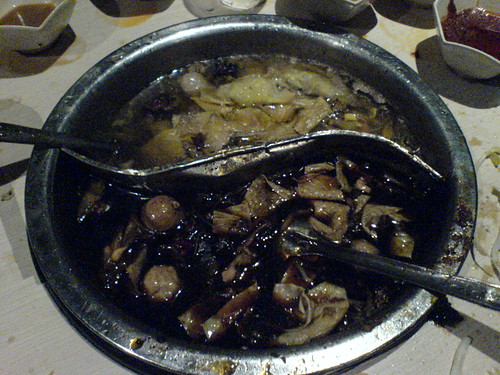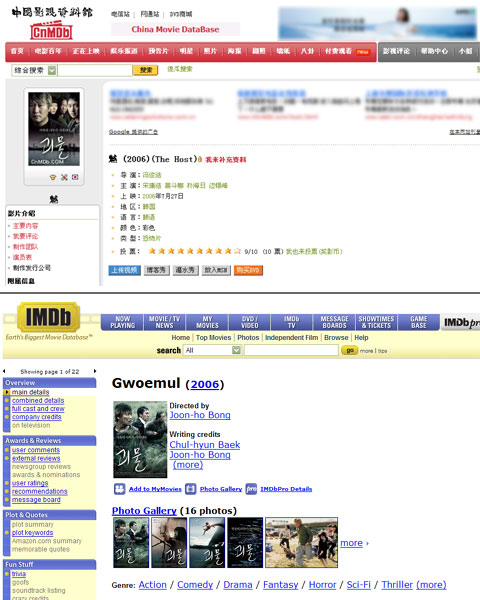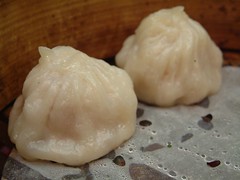20
Jan 2007The Chinese Voices Project
Clavis Sinica is a piece of software similar to Wenlin. It helps you read Chinese by giving you definitions of words when you hover over them. I don’t use Clavis Sinica; in my research I’ve found that it’s pretty widely regarded as an “OK” tool but inferior to Wenlin in the quality of its dictionary.
But now Clavis Sinica is offering some very useful resources on its website: the Chinese Voices Project. In the page’s own words:
> Welcome to Chinese Voices, a collection of short, original Chinese mini-essays with accompanying audio for intermediate and advanced students of Chinese language and culture. All of the selections are written by savvy young Beijingers and are read in their own voices. The topics have been selected to help provide insights and perspectives you can’t get from language textbooks, the New York Times, or the China Daily.
I have to say, I don’t think any of the current offerings go beyond the intermediate level, but it’s still pretty cool. They’re all a very manageable length. I wasn’t able to listen to all the audio (the internet is still really slow here until they fix those stupid cables), but I like that there’s a variety of speakers (well, supposed to be — right now it’s mainly one guy and one girl doing the recordings). There are currently 10 offerings:
– Tutoring for the College Entrance Exam
– If You Love Me
– Addressing Beijing’s Traffic Snarl
– Yuanmingyuan: The Film
– Reclaiming the Mother Tongue
– Going Home for the Holiday?
– Beijing Opera Artists
– Christmas Eve Birthday
– No Answer is Also an Answer
– Walking in the Snow
Via the ChinesePod Forums.
18
Jan 2007Fame and Celebrity in the New China
It’s not new, but it was too good to go unlinked to:
> BARTHOLOMEW FRANKS AND THE SPECIAL FEW—A STORY OF FAME AND CELEBRITY IN THE NEW CHINA
> BY PABLO
> CHENGDU, CHINA—Bartholomew Franks knew he was a Seriously Important Person the first time he was recognized on the street by a complete stranger.
> “I was just walking around, thinking about velcro, when suddenly this complete stranger walked up to me, all smiling, and said ‘hallo.’ ” The man was a local seller of steamed buns who, Mr. Franks explains, recognized him by the fact that he wasn’t Chinese, and had a big nose. “‘Chang bizi’ that’s what he kept on saying to me, laughing. ‘Chang bizi.’ I thought it was pretty cool, so I gave him five kuai and a flourish of my hair, which is long, and flaxen”
> [read whole story]
From Long Legged Fly.
17
Jan 2007The Computer Buying Game
Last Sunday I bought a new computer. I’m about to move into my new place, and I suppose I’m still in the throes of consumerist passion. It just seemed like a good time to plunk down a neat stack of cash to buy the system I’ve been wanting for a while. I haven’t had a new computer since 2002, when I bought one in Hangzhou with Wilson. It was time.
Then this week I learn from a blog post that my friend John also bought a new computer. Only he bought it at The Xujiahui Best Buy. Best Buy?! Yes, Best Buy.
He reports it as a very satisfying experience in which he paid a reasonable amount and took home quality merchandise which he can be sure is the real thing.
My first reaction to reading this entry was, “Did I make a mistake?” I could have bought my new computer at Best Buy too. Instead, I bought it at the Metro City (美罗城) computer market in Xujiahui (very close to the Best Buy), from a shop I’ve bought parts from before and had no problems. I can’t be sure that the store is totally honest, but it seems decent. The shop is on the fourth floor, which is good, because the higher you go the fewer customers you get. So on the fourth floor, they’re more willing to cut you deals and to help you find the equipment you really want at other shops if they really don’t stock what you’re looking for.
Still, John seemed so content that he had gotten a good deal, and now I was left with doubt.
But then my mind came round again. How could he abandon the game? Buying a computer in China is not walking into an immaculate store manned by a grinning, competent staff. Buying a computer in China is to play the game, to be full of suspicion, to take risks, to engage in the battle of wits.
You have to carefully select your computer store. Don’t go with one on one of the first floors, and don’t go with one that is too loyal to certain brands. Don’t go with one that is too small or too big.
You have to choose your parts from their list. It’s all in Chinese, but they often know the English names of the brands… if the brands even have English names. The crux is knowing when it’s OK to get Chinese brands (key word: 国产), and when you have to insist on brands you know and trust. If you really have to have something that’s not on their list, you have to push them to go out and get it.
You have to know that there’s always wiggle room in the price, but also that they usually won’t even try to rip you off too much because the competition is right next door. So you can’t cut their price in half, but you can’t pay the initial price either. It helps to be familiar with hardware prices before you go. Shop around.
You have to inspect each and every piece of hardware they install to make sure you’re getting what you pay for, and then you have to keep your eyes on that hardware until it’s actually in the machine. It’s so easy to pull the ol’ switcheroo on the unwary customer, and most are clueless college students who’ll never know the difference anyway. Watching like a hawk keeps them honest. (I didn’t trust my store that much.)
You have to really badger them if you want a copy of English Windows XP. Regardless of what language you get, make sure it’s SP 2 they’re installing, because anything earlier will likely be crawling with viruses the moment it connects to the internet. Also make sure they partition your hard drive how you want it, because sometimes they do ridiculous things.
You have to make sure you’re getting the proper warranties and receipts. Stuff breaks, even when the shop is honest.
You have to get their business card with phone number. Make sure they know they’re going to be hearing from you if you have any problem whatsoever. It’s best to do this before they actually start assembling your new machine.
This is the game. It may seem a little sick, but I kind of like it, and the game might not be around for much longer. I think that megastores like Best Buy are going to destroy these sketchy computer markets in the long run, but until they do, they won’t have my money. I play the game.
15
Jan 2007Yellow Snow
Q: What do these Chinese women have in common?
A: They all have the Chinese name 黄雪, which in English means “Yellow Snow.” (Comedic gold, this is!) The surname Huang is fairly common, and it’s not unusual for girls’ names to include the character 雪.
If you want to see more Chinese yellow snow, you can do a Baidu search for 黄雪. Unfortunately, the term more often seems to refer to snow in northern China (and Korea) that mixes with the yellow dust. Not as funny.
Thanks to John B for bringing this Chinese name to my attention!
14
Jan 2007Hot Pot Gone Wrong
“Hot pot” (火锅) is one of the most universally loved Chinese dining experiences. It only seemed natural for us to take ChinesePod blogger Frank for hot pot when he came for a visit.
It was a nice meal, and reasonably priced (we ate at 傣妹 on Huaihai Lu). It went a little bad, towards the end, however. Part of it was my fault. I ordered too much food. Then, as we were all getting really full, we dumped too much food into the pot at once. The result was that some of the stuff on the bottom started to burn. The food began to take on a “smoky” flavor which just got really nasty as the reddish spicy broth turned brown. Here’s a pic:
So enjoy your hot pot, folks, but eat responsibly. Even hot pot can go bad.
12
Jan 2007Thoughts on Simplification
A lot of people have strong opinions on the PRC’s simplification of Chinese characters. You typically hear the “traditional faction” decrying simplified characters as ugly and deformed, a brutal aesthetic assault on one of Asia’s most revered art forms. Meanwhile, the “simplified faction” is equally brutal in its pragmatism; why should I write 聽 when I can write 听, or 醫 when I can write 医, or 讓 when I can write 让? They’re all commonly used characters.
I’m not posting this to get back into that debate, because quite frankly it’s a rather silly one that ignores some important points. From a linguistic perspective, the simplifications were rather well thought out in many ways (although perhaps less so in others). It’s rather refreshing, then, to read a linguist’s perspective on the issue that acknowledges valid points on both sides of the arguments and brings attention to some key points. On the excellent linguistic blog Language Log, check out: Notes on Chinese Character Simplification and Doing what comes naturally (which includes commentary by Victor Mair).
An interesting quote:
> There are many characters that have 雨 “rain” as radical. These include: 雪 “snow”, 霏 “to fall (of snow)” 雹 “hail”, 露 “dew”, 電 “lightning, electricity”. This last, however, has been simplified to 电; it has lost its radical. Many people dislike simplifications of this type because they think that delinking characters from their radicals disrupts the system. I’ve chosen this example in part because this is a case in which one might argue that the principal current meaning is “electricity” and that this has so little relationship to “rain”, “snow”, and so forth that it is not a disadvantage and indeed is perhaps a virtue to dissociate it from the characters with the rain radical. In most cases, however, the semantic relationship persists and the semantic information provided by the radical is arguably useful to the reader.
> Another factor is that many Simplifications violate structural principles governing the well-formedness of Chinese characters. Here is the traditional form of “to study” 學. Its Simplified counterpart is 学. The simplified form has been standard in Japan since the reform of the writing system after the Second World War. I’ve never met anybody who objected to the Simplified form. It looks just fine. In fact, the traditional form is difficult to write without making it look topheavy, though I think it looks rather dignified in such contexts as the bronze plaques at the entrances to universities.
Via John B (the latest blog iteration).
10
Jan 2007Morning Subway Runners
On my daily rush hour commute to ChinesePod, I’ve noticed something about the subway commuters on Line 1 and Line 2 in Shanghai. Everyone is in a hurry to get to their destinations, but some so much so that they are actually running. Of these morning subway runners, the vast majority are female. I don’t have any statistics, but I’ve been noticing this for weeks, and I figure the females outnumber the males by something like a 5:1 ratio.
OK, so why? Why do the women run in much larger numbers than the men? Are there reasons for this? I’m not sure, but I have a few crackpot theories:
1. Running is not manly. (Chinese men are late with dignity.)
2. The men are not the ones always running late.
3. The men are more secure in their jobs (i.e. the women feel they face a greater risk of being fired or getting in trouble if they’re late).
4. The women actually take their jobs seriously.
5. The women actually have jobs.
6. The “rush rush rush” Shanghai atmosphere affects the female psyche more potently.
Is this a universal phenomenon or a Shanghai phenomenon? I don’t even know; I’ve never really lived in a big city until Shanghai.
08
Jan 2007Shanghai's Cycling Thug
My ChinesePod co-worker Colleen, new co-host of The Saturday Show and outstanding Canadian, is a very sweet girl. I was shocked to hear that she recently fell victim to violence on the streets of Shanghai.
She was walking along the side of a downtown street in broad daylight. Bicycles were going by, as usual. Suddenly an oncoming cyclist stuck out his arm and intentionally clotheslined her, knocking her to the ground. As she lay on the street, stunned, she heard her attacker laughing as he rode away.
It was really hard for me to believe this story. Shanghai is usually so free of violent crime — especially against foreigners. I can’t imagine what possessed the guy to do that.
I’ll resist the urge to try to start a Chinese-style internet witch-hunt for “a Chinese guy on a bike in a jean jacket.” This kind of thing really is rare.
05
Jan 2007Micah on Chinese Movie Titles
Micah has an interesting post on some of the factors that come into play when translating a foreign movie title into Chinese for mainland viewers. In the entry he talks about the titles of the following movies:
– The Host (Korean)
– Pirates of the Caribbean
– Night at the Museum
– The Devil Wears Prada
– Casino Royale
– Tsotsi
– Transformers
Micah tells us that the Chinese name of the creature in The Host is 魊. Hoping to see what a 魊 supposedly looks like, I searched for an image of it on Baidu. Although page 2 of those search results seems to suggest that the creature looks like Maggie Cheung, I didn’t really get my answer. However, I did end up discovering a site I didn’t know about: CnMDB.com. Yet another Chinese site shamelessly ripping off a successful foreign website. (Yawn.)
Note that the IMDb page has no ads (in this selection), way more movie pictures, and uses a romanized version of the Korean name.
03
Jan 2007Toys "Я" Us in Chinese
I remember not long ago I was wondering how Toys “Я” Us would write their name in Chinese. I recently got my answer in an ad at People’s Square subway station:
So the obvious parallel is instead of the “R” being represented as the cutesy “Я”, the character 反 is written upside down. This makes sense because 反 means “to turn over.”
What was not so clear to me was the meaning of 反斗. The Chinese name for Toys “Я” Us is 玩具反斗城, which partially translates to “Toy 反斗 City.” What is this 反斗, which doesn’t turn up in any of my dictionaries? I Googled it, and I got a rather lengthy explanation of the term in Chinese:
> 「反斗」一詞源自「反斗星」一詞,而「反斗星」又是從「魁星」中演化而來的。魁星,本來是指北斗七星中的前四星,即天樞、天璇、天機、天權的總稱。因此四星排列成梯形,狀似「斗」,而古代稱「羹斗」爲「魁」,故名。
> 不過,由於「魁」與「奎」同音,故又被後人錯認爲是白虎七宿的第一宿「奎星」,奎星主管文章(漢朝緯書《孝經授神契》:「奎主文章」),則俗稱的「文曲星」。顧炎武的《日知錄·魁》寫道:「奎爲文章府,故立廟祀之。乃不能像奎,而改奎爲魁,又不能像魁,而取之字形,爲鬼舉足而起其斗。」
> 所以,民間流傳的「魁星」形像就是一個用腳踢斗的鬼!則所謂的「魁星踢斗」。故廣東人又稱之爲「反斗星」。
> 所以,「反斗星」包含兩層意味,
> 一、它是「文曲星」,主管天下文章,自然是「聰明絕頂」;
> 二、外形是一個用腳踢斗的鬼,難免給人一種「頑皮不羈」的印象。故粵語的「反斗星」指的就是那些聰明而又頑皮的小鬼。
> 「反斗星」又可稱之爲「星君」。周星馳主演的《百變星君》,其片名就有一語雙關之意,這「星君」既可指「周星馳」,又可指「反斗星」,的確是個絕妙之至的片名。
So basically, 反斗 has connotations of “clever” and “a little naughty.” Like a kid who writes “are” as “Я”? I guess.
According to Wenlin, 斗城 also means “a very small city.” I wonder if that factors in too?
01
Jan 2007The One-kuai Roll
The starting fare for taxis in Shanghai is 11 RMB, or, as the locals say, 11 kuai. This amount increases as a function of both distance traveled and time. This is all well and good.
What is not well and good, however, is a trick the taxi drivers frequently pull which I will dub “the one-kuai roll.” The typical one-kuai roll scenario is something like this:
> Scene: in a taxi on the streets of Shanghai, in light traffic.
> You: OK, this is good. Stop here.
> Driver: What? Here? [taxi slows down but continues moving forward]
> You: Yes, Here! Here! [taxi still moving forward]
> Driver: OK, I’m stopping. [taxi still moving forward]
> You: Stop! Stop! [taxi still moving forward]
> [Just as the taxi finally rolls to a stop, the fare increases by one kuai.]
> Driver: That’ll be 21 RMB, please.
> You: D’oh!
That’s the one-kuai roll: a sly move to bump the fare up by just one more RMB. It seems like almost all the drivers do it. It’s only one kuai ($0.12), but man, it’s annoying.
31
Dec 2006Maybe we'll get something better?
Internet access in Shanghai remains really bad. I am able to access Sinosplice and ChinesePod only really late at night, and they’re still slow. A lot of sites are still pretty much inaccessible.
I noticed this article tonight:
> Verizon Business, part of the No2 US phone carrier, announced this month plans to build an undersea cable with five Asian partners. It will directly link China with the United States and is due for completion by the third quarter of 2008.
> The company said on Thursday it would use the Trans-Pacific Express cable to launch a “mesh” communications network to ensure uninterrupted voice and Internet service in case of a disruption by re-routing traffic on alternate lines.
I like the sound of that. (But wait a minute… Verizon can’t even do math. Can they really pull this off?)
28
Dec 2006The earthquake broke my internet
There was recently an earthquake in Taiwan which destroyed the key nodes in China’s trans-Pacific internet connection. As a result, most traffic between China and the US on the internet has slowed to a near-impossible crawl. Fortunately Google (and Gmail) still work.
This means I won’t be updating this blog much until it’s fixed. It means ChinesePod has quite a headache (our servers are in the US). It means it’s going to be a lot harder to get good material from my critical discourse analysis presentation next week. (We had wanted to use American presidential campaign videos or presidential speeches as source materials.)
Life goes on. In the meantime I’ll probably read more (books!) and get more sleep. Frightening. (My only other alternative is to make due with the Chinese internet, and I really don’t see that happening.)
[More news on this internet-shattering earthquake event]26
Dec 2006Jamie Needs a China Destination
My friend Jamie Doom is planning his return to China. But he’s not exactly sure which part he wants to live in:
Hangzhou and Shanghai are also interesting options. Many of my best friends living in China live in those two places. I have already lived in Hangzhou. Shanghai is a big convenient city. Neither town would make me get out of my comfort zone that much.
So I have been thinking of going somewhere new. But where? I want a town that is no more than three million people and no less than 100,000 people. I want a place that has some natural beauty nearby. I like the outdoors and living somewhere beautiful does lift my spirits on those invariable days of loneliness and confusion. I need some help. I need some advice. If you are a China expat or a Chinese and you live in a cool place. Tell me about it. Could your town use another laowai?
Jamie’s population requirements rule out the usual recommendation of Beijing (pop. 7,440,000) or even Tianjin (pop. 5,090,000), but not some of the other popular but slightly smaller choices such as Nanjing (pop. 2,820,000), Chengdu (pop. 2,340,000), Dalian (pop. 2,181,600), Qingdao (pop. 1,860,000), Kunming (pop. 1,540,000), and Xiamen (pop. 697,000).
If you have any helpful suggestions, head on over to to Jamie’s entry: A Dart and a Map of China.
24
Dec 2006Christmas Songs in Chinese

OK, I’ll admit it. I like some Christmas songs. Not so much “Rudolph the Red-Nosed Reindeer” as some of the more traditional ones. So I get a kick out of hearing these songs sung in Chinese. Thinking that some of you may feel the same way (you all seemed to really enjoy the Hakka Jingle Bells song), I decided to put together an album of Chinese Christmas music.
This album contains secular kids’ classics like “Jingle Bells” as well as religious classics like “What Child is This.” Some songs sound like they are sung by a church choir, while others are more playful. Some of the songs’ sound quality is good, while others’ are abysmally low. The melodies are familiar, but the lyrics are all in Chinese. Oh, yes. You need this to make your Christmas complete.
The Sinosplice Chinese Christmas Song Album (~40 MB)
1. Jingle Bells
2. We Wish You a Merry Christmas
3. Santa Claus Is Coming to Town
4. Silent Night
5. The First Noel
6. Hark! The Herald Angels Sing
7. What Child Is This
8. Joy to the World
9. It Came Upon a Midnight Clear
10. Jingle Bells
11. Santa Claus Is Coming to Town
12. Silent Night
13. Joy to the World
I’m a little disappointed that I didn’t find Chinese versions of “We Three Kings of Orient Are,” “The Little Drummer Boy,” or “God Rest Ye Merry Gentlemen,” but I suppose these will do.
Merry Christmas.
Update: Song lyrics now available (simplified Chinese + pinyin, PDF format)
All songs gathered through Baidu MP3 search. ID3 tagging done with MP3tag. Audio normalizing and editing accomplished with Audacity.
21
Dec 2006Soccer in China
There’s a hilarious entry on a blog called Long Legged Fly about playing soccer in China. An excerpt:
> But the best part of this whole experience is that you cannot play soccer on this field without getting hurt. The ground is too hard. The ground is too slippery. The ground has too many divets and weird ditch like things that zigzag across it. Plus, the Chinese players are very grab-happy and kick-your-shins-happy. So essentially what the Chinese have done is invent something that yet again the world can imitate–an open-air factory that produces injuries. Playing here I have injured my groin, my wrist, my left ankle, my right ankle, a number of my toes, my shins, my face, as well as other parts of my body that I didn’t even know existed until I got them injured, such as my bozon and my kleptok.
Check out the whole thing.
19
Dec 2006The Not-So-Secret Ingredient to a Happy Chinese Marriage
Tonight my “wife” and I will attend part three of an 8-week marriage preparation course. The Catholic Church requires all couples that wish to be married with the blessing of the Church to undergo this course. The purpose is not really to educate couples about Catholicism, but rather to ensure that the couples have closely examined the big questions before they officially tie the knot (and by “officially” I mean “in the Church”). One unexpected thing about the course is that it’s jointly conducted by a mainland priest and a Taiwanese nun, using Taiwanese materials*.
Last week’s session was rather enlightening. Altogether, there were nine couples in attendance. The theme was “this is how I grew up.” It was all about understanding how each person’s family background differed, and how that would affect the couple’s life together.
Obviously, there’s a million things that could come up in this discussion. The one that came to mind for us was the difference between being raised as an only child in modern China and being raised in a family of five in the States. (Without going into too much detail, I’m just going to say that there’s no way in hell that any future child of mine is going to glide through childhood without doing any chores, regardless of what culture he grows up in.)
So that’s a serious issue, but it’s one that is largely due to the intercultural nature of our marriage. Still, you can imagine that plenty of equally serious domestic issues would be raised… Money management, in-laws, work issues, bad habits, anything related to child-rearing, etc. So which topic was raised and repeatedly stressed by every single couple except us? You guessed it. Food.
The following are some of the crucial issues raised by the other couples:
1. His family likes bland food, but I’m used to strong seasoning.
2. I like spicy food, but his family can’t eat it.
3. I have to have soup with every meal, but his family never eats soup.
4. My family always makes lots of dishes, but his only makes 3 or 4 per meal and never wastes any food.
5. Her family takes a really long time to eat.
Now don’t get me wrong; I don’t mean to judge these people. But you would think that after all this time I would have at least learned one thing: the paramount importance of food to the Chinese. I really hope I’ll get it one of these days and stop being astonished.
* This is interesting because the Catholic Church in Taiwan is currently in direct communion with Rome, while the mainland Catholic Church in the mainland is still the Chinese Patriotic Catholic Association, which is not officially in communion with Rome.
17
Dec 2006Bible Stories in Chinese
From time to time I search for random things using Baidu’s MP3 search. Sometimes I find interesting things, such as Buddhist songs. My most recent interesting find has been Bible stories in Chinese.
One of the Bible stories turned up in a search. I listened to it and rather enjoyed it, and noticed that the filename used a simple numerical progression. I fired up my download manager, and a little while later I had downloaded all 150 Old Testament Bible stories. Based on the filenames of the ones I had, it was easy to guess what the filenames of New Testament Bible stories would be. Pretty soon I had all 120 of those as well. Only later did it even occur to me to check out the site they all came from: www.jdty.com.
That website only lets you download them one by one, but it does have names for all of them, which the filenames don’t. The MP3 files there don’t have any ID3 tags at all. I copied the filenames into a simple index file, then used a program called MP3tag to edit the MP3s’ ID3 tags, giving each MP3 file a title, track number, etc. (That way when you play them on your media player or MP3 player you can see the names of the individual stories.)
Based on the message in the footer, jdtjy.com is not the owner of the copyright for the files. Still, I can’t see any anyone getting upset about me re-releasing these MP3 files in a bulk download, so here they are, until I’m told it’s not kosher:
| Bible Stories: Old Testament (150 MP3 files, 224 MB) |
Bible Stories: New Testament (120 MP3 files, 165 MB) |
I think these Bible Stories are really useful listening practice for many Westerners with a Judeo-Christian background. A lot of us grew up hearing these Bible stories, but we may not have heard them recently. Still, when you listen to these MP3s, you have a context, and you can likely figure out which Bible story you’re listening to even if you have no clues besides “Old Testament” (which is how I started out listening to them). That context really helps you fill in any vocabulary or comprehension gaps. It also forces you to learn to recognize the Chinese names of familiar characters such as Jacob, Moses, Abraham, Joseph, etc.
Despite having that familiar context, what makes these Bible stories so interesting to me personally is what’s different. There’s melodramatic music in every episode, and the storytellers took some liberties with the way the stories were told. In doing so, they injected a healthy dose of Chinese culture. Just listen to the way Mary talks to baby Jesus, or the way the Israelites argue with Aaron over creating the golden calf. And then of course, there’s the fun of hearing the voice of God in Chinese, or Abraham sounding like an old Chinese man. To me, it’s just really entertaining.
Download away! If you just want to hear one or two before you download them in bulk, you can download one or two from the jdtjy.com site first. Oh, and if you’re looking for a Chinese Christmas Story, it’s #005 and #006 (in the New Testament, of course).
Note: These are big files. I figure I can handle the load because (1) probably not too many people are going to download them, and (2) Dreamhost gives me a ridiculous amount of bandwidth, of which I use up approximately 0% every month. If bandwidth does become a problem, I might have to figure out how to set up a torrent…
16
Dec 2006AdsoTrans, ChinesePod Alliance
I mentioned last week that David Lancashire of AdsoTrans came to Shanghai on a visit. The “big secret” was that he was here on a mission. He was checking out ChinesePod HQ before considering a job offer. But all that is old news; as David has already revealed on his blog, he will be working for ChinesePod starting in January.
This is cool for many reasons. David has done a lot of amazing work on AdsoTrans (and News in Chinese), all as a hobby. He’s only one guy, but he’s one really smart guy, and he’s managed to put together a very impressive web app, as well as lots of other learning materials, all under the guise of “hobby.” He’s been translating in Beijing to pay the bills, but it’s clear where his passions lie.
Now he can get paid to do the same “fun stuff” at ChinesePod, but on a larger scale. At the same time, ChinesePod’s rather unimpressive “glossary” component is about to do a lot of growing up.
There are so many possibilities that I can’t go into, but let me just say that it’s really an exciting time to be doing what we’re doing. To the rest of the world we might appear to be just geeks into Chinese, but I think that a year from now we’re going to be able to look back and see that in 2007 online Chinese study got a whole lot better.
14
Dec 2006Windows of Deliciousness
The other day at work we discussed what I will call “windows of deliciousness” over lunch. A window of deliciousness is the period of time during which a certain kind of food is at its most delicious. Most hot foods start out at peak deliciousness, but once they cool down to a certain extent, they are no longer what could be termed “delicious.” The window of deliciousness for many types of food, from “straight out of the kitchen” to “too cold” might last 10 minutes or so. But there are exceptions.
Take for example the Chinese 小笼包. These little dumplings are well known as one of Shanghai’s tastiest treats, but they’re also the culprit in countless consumption casualties. These little dumplings house a scalding dose of “soup” capable of melting the face off of unwary foreigners. The little dumplings are, admittedly, very good, but the wise always let them sit a little while before digging in. (The wise remember how long it took them to grow all those taste buds back.)
小笼包 have yet another special quality. If you let them sit so long that they get cold, they’re not good at all! This is where the window of deliciousness comes in. Due to their special circumstances, these little dumplings have a window of deliciousness of approximately 30 seconds. (OK, maybe 45.)
This got me thinking about western food, and how its windows of deliciousness might compare. I immediately thought of pizza, and realized that pizza is just as special in terms of window of deliciousness as 小笼包, but for the opposite reasons.
Freshly made pizza is delicious. Sure, the cheese might be hot at first, but it’s nothing like the lethal lava-broth that the tiny devil dumplings are packing. As pizza cools, it loses a bit of its deliciousness, but the story doesn’t end there. You take the uneaten portion home and plant it in your refrigerator. In that wintry cocoon your pizza undergoes a miraculous phase transition. It is no longer just “pizza.” It emerges from the metamorphosis an entirely new animal: leftover pizza.
Leftover pizza is different because you eat it cold. In that state, its window of deliciousness has gotten a second wind, which fades only as the pizza once again approaches room temperature. That’s not much of a concern, however, because the chances are good that the pizza will never survive that long. Let me reiterate the important point: pizza has two windows of deliciousness, both of respectable length. This is frickin’ amazing.
I can’t confirm it quite yet, but I think this research may lead directly to the ultimate, incontrovertible triumph of western food over Chinese cookery. I am quite certain that when faced with this new evidence the Chinese will gracefully concede defeat in this long and bitter war of the cuisines.








